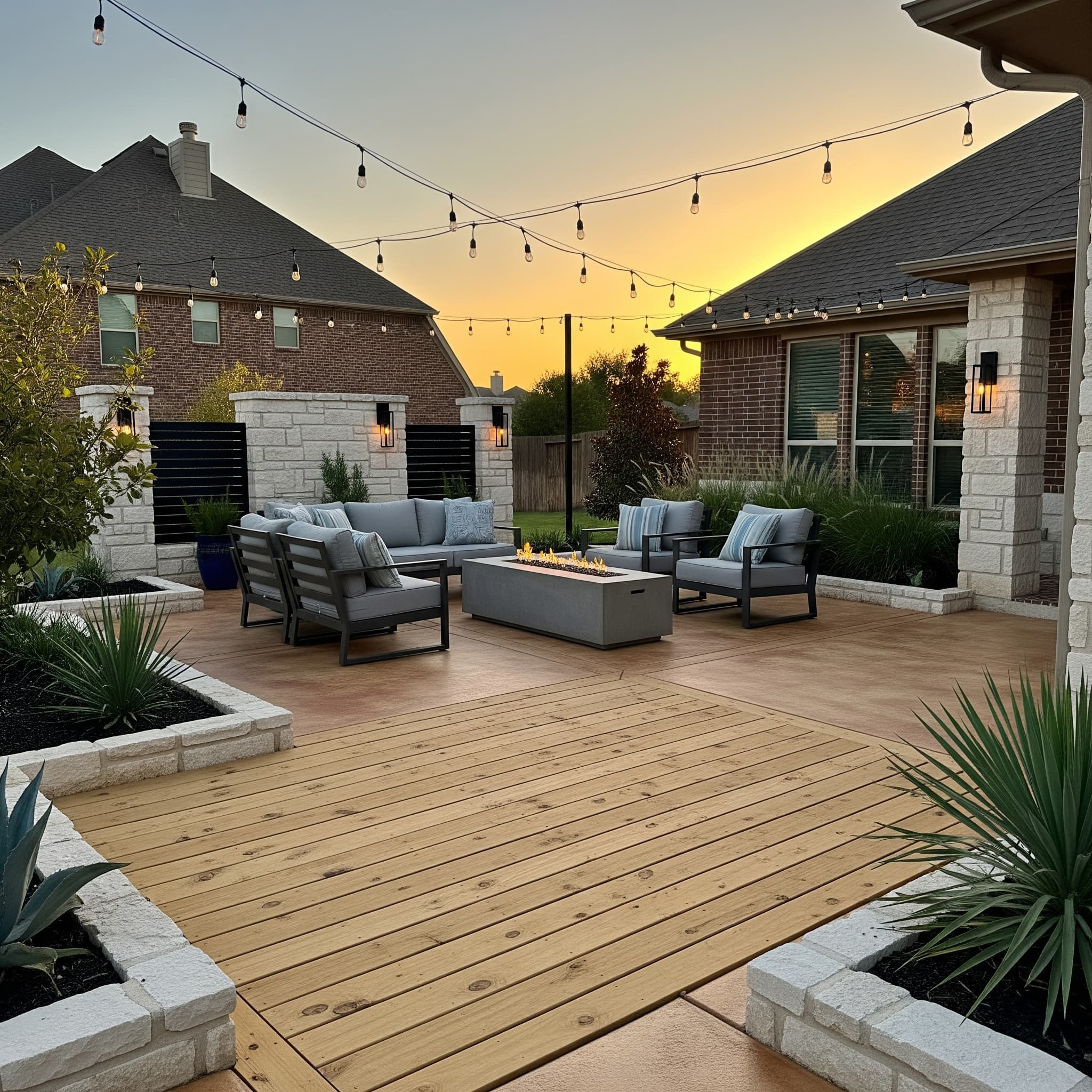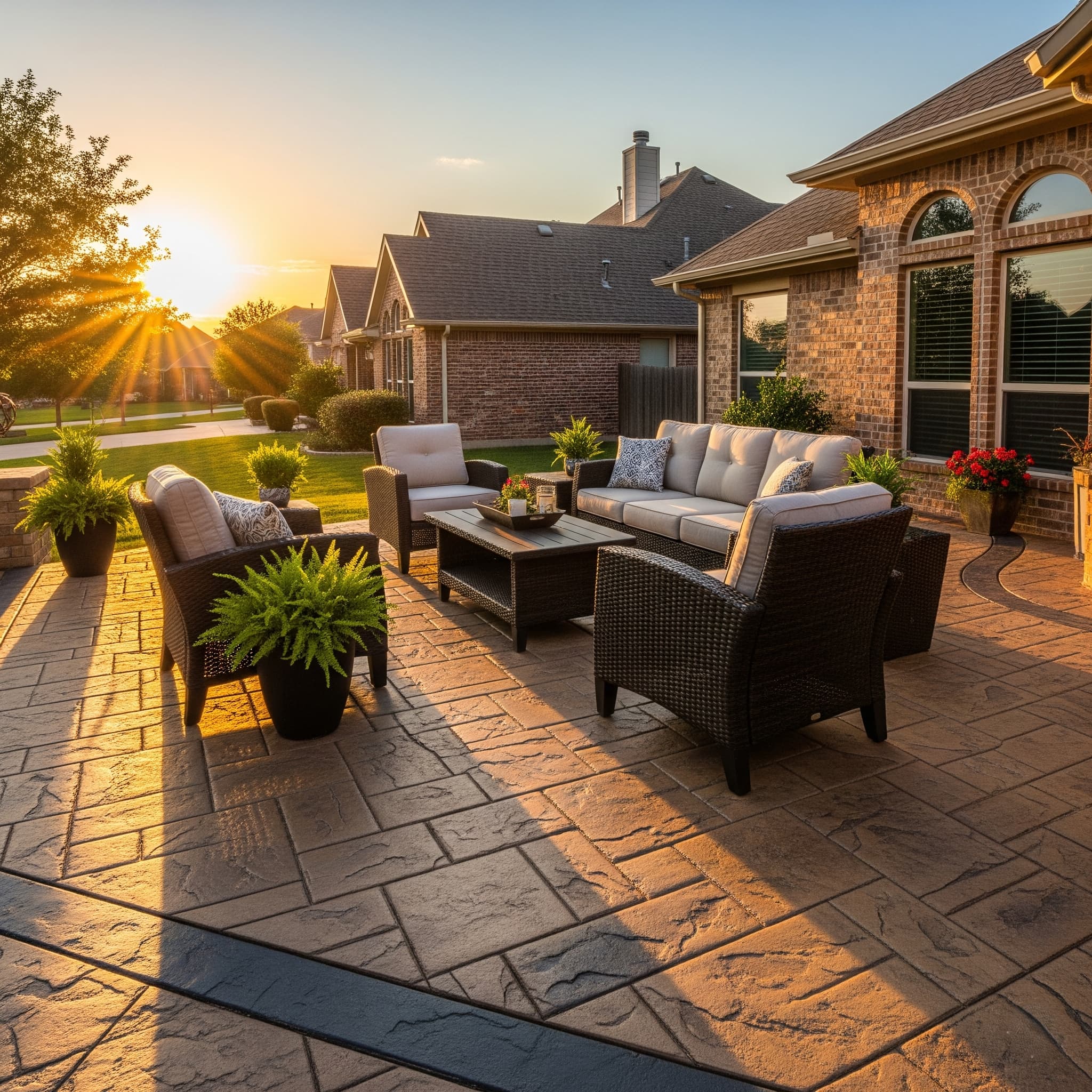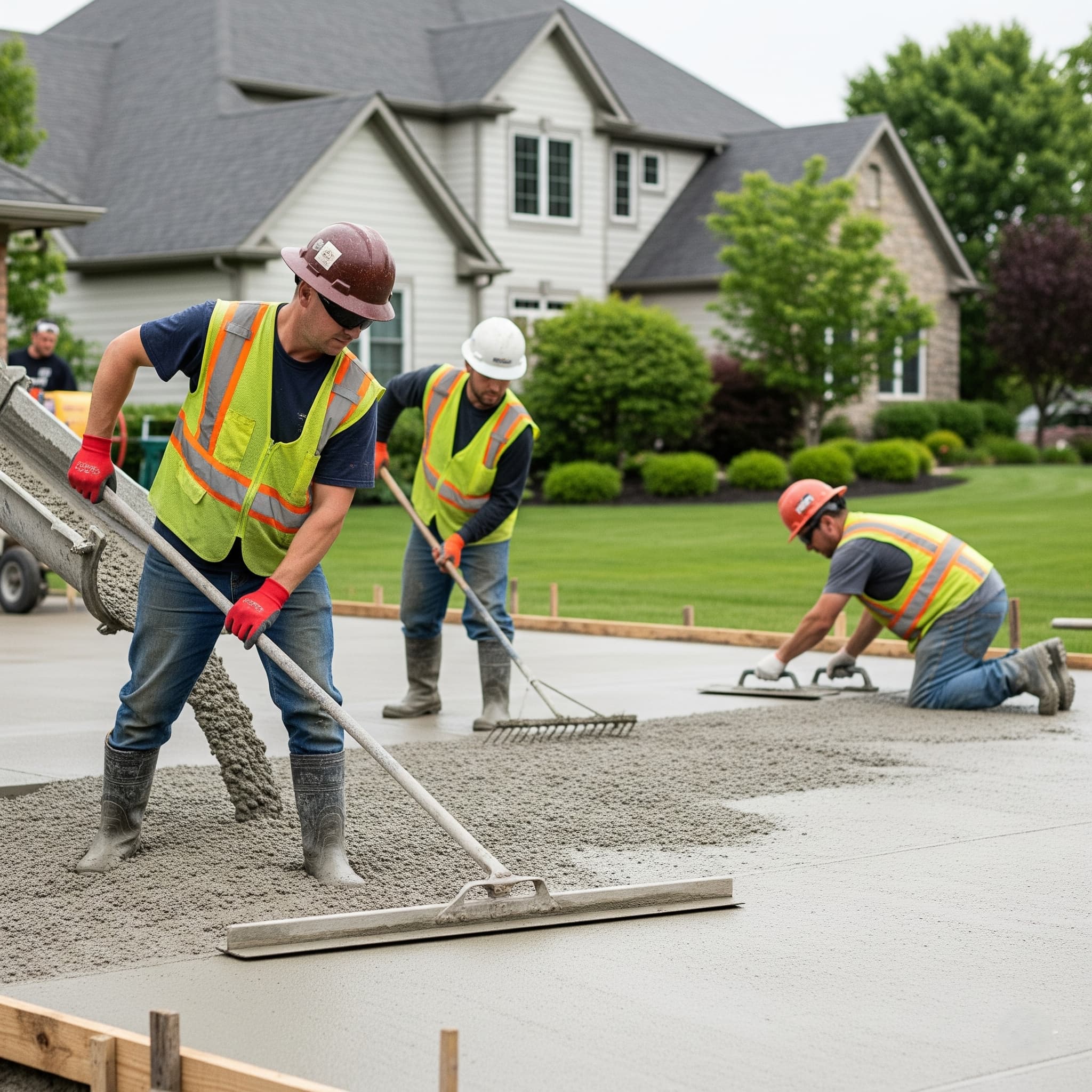Grand Prairie Concrete Pros - Frequently Asked Questions
If Your Question Is Not Answered Here Drop Us A Line
What does professional concrete driveway installation cost per square foot in Grand Prairie?
Professional concrete driveway installation in Grand Prairie, Texas, typically ranges from $7 to $14 per square foot, reflecting the region’s favorable climate conditions and competitive market. Standard 4-inch reinforced installations cost $7 to $10 per square foot, while premium 6-inch driveways with decorative finishes reach $12 to $14 per square foot. Texas’s minimal freeze-thaw requirements reduce the need for specialized additives, helping control material costs. The competitive Dallas-Fort Worth metropolitan area market provides numerous suppliers and contractors, though summer heat precautions and occasional severe weather can affect scheduling and pricing during peak construction periods.
How do complete replacement costs compare to driveway resurfacing in Grand Prairie?
Full driveway replacement in Grand Prairie costs $9 to $16 per square foot, while professional resurfacing services range from $4 to $8 per square foot. Replacement involves complete demolition, excavation to stable subgrade, proper reinforcement installation, and new concrete meeting Texas building standards. Resurfacing applies a bonded overlay over structurally sound existing concrete. Texas’s stable climate and minimal freeze-thaw damage make resurfacing highly viable when the underlying concrete remains intact, offering significant cost savings for homeowners with sound existing foundations that only need surface restoration.
What price difference exists between decorative stamped concrete and standard broom-finish patios in Grand Prairie?
Standard broom-finish patios in Grand Prairie cost $8 to $12 per square foot, while stamped concrete patio installations range from $13 to $22 per square foot for professional work. The premium reflects specialized labor for pattern creation, color integration systems, and UV-resistant sealing required for Texas’s intense sun exposure. Popular Grand Prairie patterns include Texas limestone, flagstone, and southwestern tile designs that complement the region’s architectural styles. Both finishes must accommodate Texas’s thermal expansion through proper joint placement and may require enhanced sealing for protection against the state’s intense solar radiation.
What factors influence concrete pricing per cubic yard in Grand Prairie, including delivery and special additives?
Grand Prairie ready-mix concrete costs $100 to $140 per cubic yard, with short-load fees of $20 to $35 per yard for deliveries under 10 cubic yards, pump truck charges of $250 to $450 per job, and delivery fees of $3 to $6 per mile beyond 30 miles from local plants. Hot-weather retarders add $6 to $12 per yard during Texas’s intense summer months. Water reducers cost an additional $4 to $8 per yard for improved workability in hot conditions. The competitive Dallas-Fort Worth market helps keep base prices reasonable, while Texas’s year-round construction season provides consistent demand without extreme seasonal price fluctuations.
What thickness works optimally for Grand Prairie driveways?
Four-inch thickness with proper reinforcement performs well for most Grand Prairie driveways due to Texas’s minimal freeze-thaw stress and generally stable soil conditions. Five-inch thickness provides extra durability for heavy vehicles or areas with problematic clay soils that experience significant movement. Six-inch thickness is typically unnecessary except for commercial applications or extremely heavy vehicle loads. The key factor in Grand Prairie is proper reinforcement and control joint placement rather than excessive thickness, given Texas’s favorable climate conditions and reduced environmental stresses compared to harsh northern climates.
What drainage slope ensures proper water management for Grand Prairie concrete?
Grand Prairie driveways need a minimum of 1/8 inch per foot slope (1%) for adequate drainage, though Texas’s moderate annual precipitation allows flatter slopes than high-rainfall regions. Patios require a minimum of 1/16 inch per foot away from structures to handle occasional intense thunderstorms and flash flooding events. Maximum slopes of 10% prevent finishing difficulties while ensuring rapid water runoff during Texas’s intense but brief storm events. Proper drainage remains important for directing stormwater during severe weather and preventing localized flooding in clay soil areas.
When are concrete overlays appropriate for existing surfaces in Grand Prairie?
Overlays work excellently in Grand Prairie when existing concrete remains structurally sound, benefiting from Texas’s stable climate and minimal freeze-thaw damage. Clean surfaces thoroughly and use bonding agents rated for thermal movement in hot climates. Minimum 1.5-inch overlay thickness works well in Texas’s stable conditions, with 2 to 3 inches providing enhanced durability for high-traffic areas. Texas’s favorable climate makes overlays more successful than in harsh northern climates, offering cost-effective renovation solutions for homeowners with sound existing concrete foundations.
What temperature restrictions affect concrete placement in Grand Prairie?
Grand Prairie concrete pours should avoid temperatures above 95°F and rarely require cold-weather protection due to Texas’s mild winters. The hot climate requires extensive hot-weather precautions from May through September, including chilled mixing water, retarders, and strategic scheduling to avoid peak afternoon temperatures. Cold-weather protection becomes necessary only during occasional winter freezes when temperatures drop below 40°F. Optimal placement temperatures of 65 to 85°F ensure proper hydration in Texas’s typically dry environment with intense solar radiation.
What is the concrete curing timeline for traffic loading in Grand Prairie's climate?
Under typical Grand Prairie conditions, concrete can safely support foot traffic after 18 to 30 hours and light vehicles after 5 to 8 days in Texas’s warm, dry climate. The hot climate generally accelerates early strength development compared to cooler regions, but rapid moisture loss can affect surface quality during finishing. Extended moist curing for 7 to 10 days helps achieve maximum strength in the low-humidity environment. Texas’s intense heat may require accelerated curing schedules for emergency repairs or fast-track construction projects using chemical accelerators.
When should new concrete be sealed in Grand Prairie, and which sealer type performs best?
Seal new Grand Prairie concrete 60 to 90 days after placement, allowing thorough curing and carbonation in Texas’s hot, dry climate conditions. Penetrating silicone sealers provide excellent UV protection and weather resistance for the intense solar exposure common in Texas. Film-forming acrylics work well in Texas’s low-precipitation environment but may require more frequent reapplication due to UV degradation. Apply sealers during mild weather conditions (70 to 85°F) with low wind, and reapply every 4 to 6 years depending on UV exposure and traffic levels.
What represents normal versus problematic cracking in concrete?
Hairline shrinkage cracks under 1/16 inch are normal in Grand Prairie due to Texas’s hot climate, thermal cycling, and clay soil movement. Cracks exceeding 1/8 inch in width, showing vertical displacement, or allowing water penetration require professional evaluation and potential repair. Structural issues may result from expansive clay soil movement, inadequate reinforcement, or poor curing practices in hot weather. Texas’s clay soils can cause significant foundation movement, making crack monitoring important for detecting settlement or soil-related problems requiring engineering assessment.
Are permits and HOA approvals required for Grand Prairie concrete work?
Grand Prairie requires building permits for most concrete work, including driveways, substantial patios, and structural concrete installations within city limits. Contact the Grand Prairie Building Inspection Department at (972) 237-8200 for specific permit requirements, current fee schedules, and inspection procedures. Permit fees typically range from $75 to $300 based on project scope and complexity. Many Grand Prairie neighborhoods have HOA architectural review standards that affect concrete color, texture, and design elements significantly. Obtain complete HOA approval before beginning work, as violations can require expensive modifications to achieve compliance with community design standards.
What Texas and Grand Prairie codes govern concrete thickness, slope, and reinforcement requirements?
Grand Prairie enforces the Texas State Building Code with local amendments for concrete construction in the hot climate region. Residential driveways require a minimum 4-inch thickness with appropriate reinforcement and proper slope for drainage during intense rainfall events. Footings must extend below Texas’s minimal frost line (typically 12 to 18 inches) and accommodate clay soil movement. Environmental provisions may require compliance with air quality standards during construction. All concrete work must meet ACI 318 standards as adopted by Texas, with considerations for thermal movement and clay soil conditions rather than freeze-thaw resistance.
What inspection requirements apply to Grand Prairie concrete projects?
Grand Prairie mandates inspections for permitted concrete work, including footing inspection before placement, reinforcement and form inspection, and completion inspection. Schedule inspections at least 24 hours in advance through the Grand Prairie Building Inspection Department at (972) 237-8200. Inspectors verify Texas Building Code compliance, including thickness measurements, reinforcement placement, slope requirements, and proper installation techniques. Work cannot proceed without proper inspection approval, and failed inspections require corrections and re-inspection scheduling with associated fees and potential project delays.
What should I ask concrete contractors in Grand Prairie about qualifications and guarantees?
Verify that Grand Prairie contractors maintain current Texas contractor licenses, comprehensive general liability insurance with minimum $1 to $2 million coverage, and workers’ compensation insurance. Request 4 to 6 recent local references with complete contact information and photographs of completed projects demonstrating quality workmanship in Texas hot climate conditions. Warranties should cover workmanship defects for 1 to 3 years and structural issues for 2 to 5 years minimum. Obtain detailed written estimates specifying Texas Building Code-compliant mix designs, reinforcement details, thickness requirements, and finishing specifications. Confirm their understanding of Texas hot weather construction techniques, clay soil considerations, Grand Prairie permit processes, and proper installation methods for the region’s climate and soil conditions.



